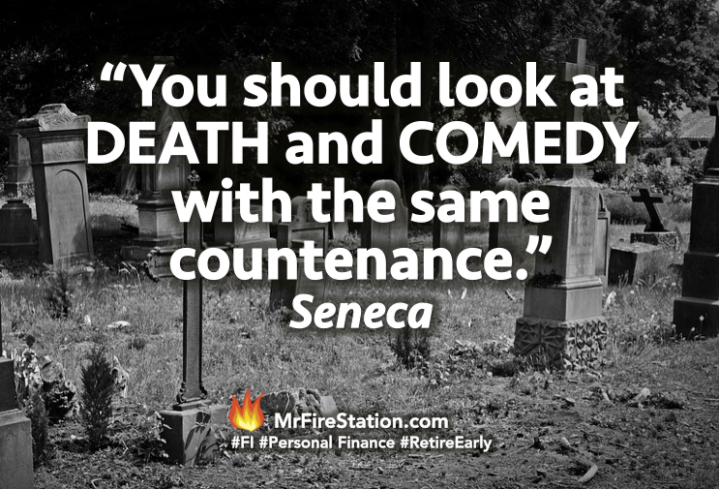
I’ve been writing about personal finance and early retirement for more than two years now and have managed to not mention the topic of life expectancy once. Since there are only three real variables to use in planning for retirement – spending, investments, and life expectancy – after over 250 posts to this site, you can see how clever I’ve been in avoiding this ‘inevitable’ topic.
I have a good friend in the insurance business for a long time who once told me that if a guy made it to age 55, he was likely to live well into his 80s. That insight, and this chart below – which shows how likely it is a husband, wife, or either will live from age 65 – has been the sum total of all of the planning I have done on this topic. In the spirit of the quote from Seneca, I never wanted my retirement planning to dampen my good humor.

For our retirement financials I simply plug ‘Age 90’ as the date of our demise. The chart shows this as about the 50%/50% point of at least one of us (my wife or I) living to. If one spouse passes away before then, that will also conserve some of our nest egg. I noticed that my financial advisor also uses ‘Age 90’ in the estimates that he does for us. That’s it though. I’ve done no further analysis on this aspect of our FIRE planning – and at least at this age – I don’t see the need to do any more.
Living to age 90 makes early retirement a LONG phase of our lives. Since we retired when we were 49, we are talking potentially 40+ years of leisure. To put that in perspective, 40 years ago was 1977. The world has changed a lot during that period of time. For the US, it has been mostly peaceful, had a few economic bumps, but has mostly been a pretty robust time with amazing technological innovation. By comparison, the 40 years previous to that included WWII, Korea, Vietnam, and a portion of the Great Depression. I’m hoping the world is on a positive trend, but who really knows?
Curiously, when I put longer retirements – reaching age 95 or age 100 into FIREcalc, the odds of us not running out of money goes UP, not down. While we have a 95% probability of not outliving our money to age 90, it goes up to 96% at age 95 and 98% at age 100. While that seems a bit curious at first, the FIREcalc model is based on historical returns and living longer means that we have more time to AVOID (or recover) from an economic downturn. Living longer certainly sounds like good news at this point, although health insurance and medical bills could be ugly financially.
Thankfully, we over-saved a bit before retiring early last year and are happy to have a little cushion to ensure we have the wherewithal to make it to whatever age we are fortunate enough to reach. We will also need to be very flexible in our spending from year-to-year as investment returns dictate for us. In the meanwhile, the best we can do is to take as good a care of our health and safety as possible.
I realize that this is not a cheery topic for a Monday, but the broadcaster Andy Rooney put a positive spin on it, saying – “We don’t ASK to get old, we just get OLD. And if you are lucky, YOU might get old, too.” And as long as we do a little planning – and keep a sense a humor throughout our lives – I’m sure the finances will be there for what we need.
How have you thought about the inevitable in your retirement planning?
Image Credit: Pixabay; Chart: Raymond James

I’ve thought of it in passing sometime. I’d rather not dwell on it, though. To mitigate the long retirement, we’re trying to minimize withdrawal in the early years. I plan to work part time for many years. This should keep our withdrawal rate below 1% until 55 at least. If all goes well, our portfolio should be able to carry us the rest of the way.
Yes, early retirees have to be flexible. Cut back a bit on bad years. Stay healthy!
LikeLiked by 1 person
Controlling you’re spending in the first few years of early retirement is a smart plan. A lot of models show that things tend to go wrong early – not later – when people are poorly planned.
LikeLike